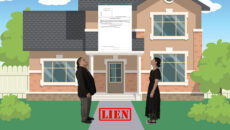Facts: An apartment landlord filed an unlawful detainer (UD) against a tenant who was unlawfully holding over. The landlord attempted to personally serve the UD on the tenant at the apartment address numerous times but the tenant was out of state. The landlord posted the notice on the property and mailed a copy to the tenant’s last known address, which was at the apartment. No other address for the tenant was available. The tenant did not receive or respond to the UD and the landlord took possession of the property.
Claim: The tenant sought to restore their tenancy claiming the landlord’s attempts to serve the UD were deficient since all the attempts were executed at the apartment address while the tenant was out of state and no other actions were taken to reach the tenant.
Counterclaim: The landlord sought to prevent the tenant from restoring tenancy claiming sufficient actions were taken to notify the tenant of the UD since multiple attempts to notify the tenant were executed at the apartment address without response and no other address for the tenant was available.
Holding: A California Court of Appeals held the tenant may not regain possession since numerous attempts to personally serve notice to the tenant were executed and the notice was posted at the apartment address and no other address for the tenant was available. [The Board of Trustees of the Leland Stanford Junior University v. Ham (2013) __ CA6th__]
Editor’s note – This decision protects landlords by not requiring them to expend an indeterminate amount of time and resources to track down an absent tenant for which additional contact information is unavailable in order to serve a UD.
If the UD cannot be personally delivered, the landlord may leave a copy with a competent adult at the property or post it on the property, then send the documents by mail to the last known address of the tenant.
The tenant has five days to respond to the UD. [Deal v Municipal Court (1984) 157 CA3d 991]
In the above Ham case, the landlord could not personally serve the tenant after five attempts in six days. A judge granted permission to the landlord to deliver the UD by posting it on the premises and mailing a copy to the last known address, which was the apartment. After the tenant failed to receive the notice, a default judgment granted possession to the landlord.















It is my understanding that in San Diego County the landlord can not serve a UD. It needs to be served by someone over 18 years of age or older who is not a party the the UD.